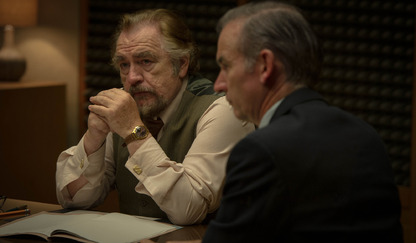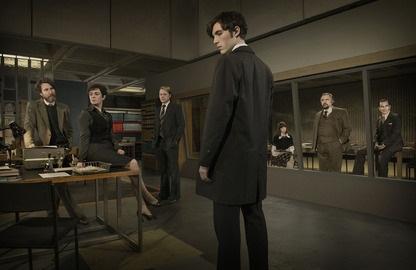Rum old business, espionage – at least in the way we Brits are still pursuing it. For all the reality that the existential threat has long moved locations, in its television incarnations we remain addicted to the Cold War, the attraction to those gloomy postwar years seemingly a fatal one. The BBC’s new spy drama The Game was back in prime le Carré territory and the early Seventies, with industrial unrest and power cuts further turning down the visual wattage. The props department duly delivered curtains that risked depriving viewers of the will to live, while the fact that Birmingham’s old library building, that monument to brutalism that’s shortly to be demolished, stepped in for some locations spoke for itself.
Which made the rummest thing in Toby Whithouse’s six-parter the character of its hero, Joe Lambe, played by Tom Hughes. Hughes has cheekbones to die for, something of the cut of a younger Cumberbatch, and a wardrobe here that looked straight out of a present-day Italian fashion magazine. “Too beautiful to die,” was how one of his heavily accented emigré contacts described him, shortly before being done away with herself. A loose Irish accent wasn’t the only thing that left us wondering quite how he’d actually ended up in this company, because he didn’t seem typical “one of us” material at all.
Quite how Joe escaped and returned to the MI5 fold was never quite made clear
More stand-out was the fact that when we saw Joe in the opening scene, he was trying to defect on a Polish river bank along with his agent girlfriend (Russian accents hovered throughout somewhere in Mitteleuropa). His dreams of early retirement in the Krasnodar countryside were dashed, however, and it’s always an ominous sign when you’re dealing with a KGB operative with a distinctive habit – in the case of lead adversary Odin (pronunciation of that one fluctuated, too), it was peeling an apple at crucial moments. We'll be seeing more of those peelings.
Quite how Joe escaped and returned to the MI5 fold was never quite made clear, except for a vague allusion, along Forsterian lines of loyalty to the individual as opposed to the country, from his chief, who’s known only as “Daddy” (Brian Cox, channelling Orson Welles). Not that everyone in the service felt the kind of filial allegiance you might have expected with a moniker like that, with hints coming especially from counter-espionage section head Bobby Waterhouse (Paul Ritter, showing more than a twist of Quentin Crisp, pictured below right with Cox) that staffing changes were overdue. Waterhouse looks like he's the show’s schemer, playing off colleagues against one another, but on the home front he’s dominated by an ambitious, upper-crust battle-axe of a mother (Judy Parfitt), who looked as formidable as anything the Soviets might have in their armoury.
 What the foe was actually up to was reactivating a roster of embedded sympathisers who are due to be brought back into action via sleeper agent Malinov, who’s been biding his time haplessly as a professor at Reading but has now decided to swap sides. “I want to be a capitalist,” he said, before reeling off a list of other expected establishment attributes, like reading the Times, watching the boat race, and sending the children to Eton. Hardly the most original grounds for betrayal, but he was offering something too sensational to be ignored, codenamed “Operation Glass”, which had the potential to define British espionage activity into its "before" and "after" moments.
What the foe was actually up to was reactivating a roster of embedded sympathisers who are due to be brought back into action via sleeper agent Malinov, who’s been biding his time haplessly as a professor at Reading but has now decided to swap sides. “I want to be a capitalist,” he said, before reeling off a list of other expected establishment attributes, like reading the Times, watching the boat race, and sending the children to Eton. Hardly the most original grounds for betrayal, but he was offering something too sensational to be ignored, codenamed “Operation Glass”, which had the potential to define British espionage activity into its "before" and "after" moments.
Whithouse has a background in comedy, and we were left wondering on occasions how much he was parodying the spy genre, not least when there was mention of a “bit of a cliché” in the developments that led to the first fatality of the series. Ongoing notes of scepticism came from Shaun Dooley as the Special Branch detective assigned to monitor proceedings, who can’t quite believe what they were all up to. The Game left me pondering too, not least how MI5 could function at all when its leading players kept helping themselves to such liberal measures of whisky at every opportunity. And, most of all, how any of us managed at all before mobiles, when the fate of the nation really might have revolved around finding a phone box at the crucial moment.















Add comment